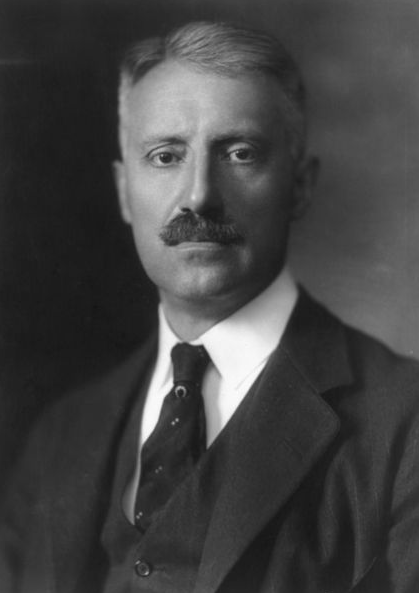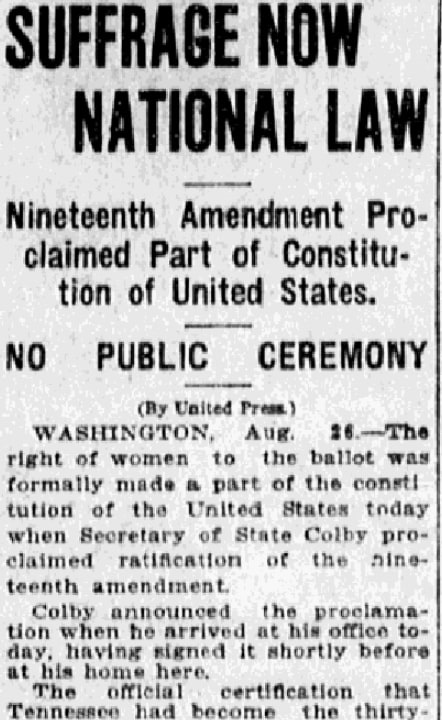Today, Aug. 26, is Women’s Equality Day in the U.S., to celebrate the adoption of the Nineteenth Amendment, based on the events described in this article. As important as this day was in 1920, it was not without a certain blemish, as described below.
With a stroke of his pen the morning of 26 August 1920, Secretary of State Bainbridge Colby certified the ratification of the 19th Amendment to the United States Constitution, granting women the right to vote. The necessary three-quarters approval from all the states was achieved when Tennessee barely ratified the proposed amendment on August 18 – by a margin of a single vote. It only remained for Tennessee’s action to be officially presented to Colby, who was ready to issue his certification proclamation announcing that women suffrage was now the law of the land.

Unfortunately, what should have been a grand celebration for women activists was tarnished in the end by a very curious decision Colby made about signing his proclamation.
Women, in groups and as individuals, worked for more than 70 years to achieve women suffrage. One of the leading groups was the National Woman’s Party (NWP), founded in 1916. The NWP had broken away from the National American Woman Suffrage Association because the latter group favored a strategy of lobbying individual states to change their laws prohibiting women from voting.
The NWP insisted it would take a constitutional amendment to fully guarantee women the right to vote, and worked long and hard toward this goal. Accordingly, a delegation from the NWP, including its leader Alice Paul, gathered in Secretary Colby’s office and stayed late the night of August 25 hoping to celebrate the historic moment when he signed his certification proclamation.

The group’s high spirits were dampened when a message arrived saying the train from Tennessee carrying the official papers was delayed. Colby dismissed the women and went home, saying the signing ceremony would have to wait until tomorrow. Then, before leaving for work the next day, Colby quietly signed the proclamation in his home office at 8:00 in the morning.
When the NWP women arrived at the State Department to witness and celebrate the signing ceremony, they were dismayed to learn he had already signed the proclamation; they left the building and refused his invitation to come back and listen to a speech he had prepared for the occasion.
Colby then invited the NWP’s rival group, the National American Woman Suffrage Association, to have the honor of listening to his speech. That group’s leader, Carrie Chapman Catt, was only too happy to accept. In his remarks Colby alluded to the NWP’s leaving in a huff, saying that participation in a signing ceremony “has, regretfully, been the source of considerable contention as to who shall participate in it and who shall not.”
Nonetheless, the deed was done: the 19th Amendment was ratified, the certification proclamation issued, and women suffrage was now the law.

Here is a transcription of this article:
SUFFRAGE NOW NATIONAL LAW
Nineteenth Amendment Proclaimed Part of Constitution of United States.
No Public Ceremony
(By United Press.)
WASHINGTON, Aug. 26. – The right of women to the ballot was formally made a part of the constitution of the United States today when Secretary of State Colby proclaimed ratification of the nineteenth amendment.
Colby announced the proclamation when he arrived at his office today, having signed it shortly before at his home here.
The official certification that Tennessee had become the thirty-sixth state to ratify the amendment was taken to his home early today.
A group of suffrage leaders who had waited until a late hour last night for the arrival of the Tennessee certification were hurriedly summoned to the state department and met Colby.
They cheered when told the last step to make the amendment operative had been taken.
Among them were: Alice Paul, chairman of the National Woman’s Party; Mrs. Abby Scott Baker, Miss Julia Emorty, Baltimore; Dr. Lydia Allen Devilbiss, of Georgia; Miss Mary Moore Forrest, Scituate, Massachusetts; Mrs. Anne Calvert Neely, Vicksburg, Miss.; Mrs. B. C. Kalb, Houston, Tex.; Mrs. Cyrus Mead, Dayton, O.; Miss Emilie Grace Kay, St. Paul, Minn.; and Miss Emma Wold, Portland, Ore.
The Tennessee certification was taken to Colby’s home by Charles L. Cooke, master of ceremonies of the state department, and Colby and Frederick Nielson, state department solicitor, went over it for possible legal flaws. They found none, it was said.
Suffragists had expected Colby to make the ceremony of proclaiming the amendment a public one and were evidently disappointed. They requested him to go through the ceremony again for their benefit and for moving picture men.
Colby said he would consider going over the ceremony again and went into his office.
The women, however, left the state department without waiting for Colby’s decision. They held a jubilation at their own headquarters a short distance away.
Miss Alice Paul declared the suffragists will not relax their vigilance until they are sure no further attempts will be made to take from the women what they have won.
“We are confident that the signature of Secretary Colby completes the suffrage struggle in this country,” she said. “Despite every obstacle that our opponents could put in our way, women have won the right to equal rights in the affairs in the government.”
Women Cannot Agree.
Colby said the reason he had not made a public ceremony of the proclamation was because of “considerable contention” as to what groups of suffrage workers should participate.
According to Colby’s aides, his decision was made because groups of women at his home last night got into a spirited argument as to who should be represented at the proposed ceremony.
“This secondary aspect of the subject has regretfully been the source of considerable contention as to who shall participate in it and who shall not,” Colby said. “Inasmuch as I am not interested in the aftermath of any of the frictions or collisions which may have been developed in the long struggle for the ratification of the amendment, I have contented myself with the performance in the simplest manner of the duty devolved upon me under the law.
“I congratulate the women of the country upon the successful culmination of their efforts which have been sustained in the face of many discouragements and which have now conducted them to achievement of their great object.”
Members of the National Woman’s Party refused to return to the state department to hear Colby’s statement. Shortly after he issued it a group of members of the American National Woman Suffrage Association, headed by Mrs. Carrie Chapman Catt, called at the department and saw him.
Note: An online collection of newspapers, such as GenealogyBank’s Historical Newspaper Archives, is not only a great way to learn about the lives of your ancestors – the old newspaper articles also help you understand American history and the times your ancestors lived in, and the news they talked about and read in their local papers. Did any of your ancestors participate in the women’s suffrage movement? Please share your stories with us in the comments section.
Related Articles:
